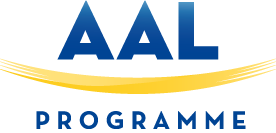Session E1
| Session E1 | ||
| Session title: | AAL Middleware | |
| Session responsible: | Reiner Wichert | |
| Session chair: | Saied Tazari | |
| Date and time: | 25 September 2012, 11:00 – 12:30 h | |
| Session partners: |
| |
| Room: | Pollux | |
| Session Content | ||
| Rationale In the past years a lot of AAL Middleware solutions have been developed. It is obviously essential to abandon monolithic proprietary concepts for complete, comprehensive solutions in favour of few established middleware approaches that allow open AAL systems to evolve over time. Such middleware solutions will be the heart of flexible AAL platforms that allow future AAL solutions providing assistance and complementing the health and care systems to expand modularly and be customizable to individual needs, lifestyle and health progression. The benefit will be twofold: on one hand, the market will be open to the enterprises of different sizes to realize their ideas for new products and services that can be added easily to broad ranges of existing settings, and on the other hand, end users will be able to pick desired products and services over time according to their changing preferences and needs and whenever they can afford. However, the emergence of such flexible and customizable systems will depend on interface definitions ensuring ad-hoc interoperability at the semantic and process levels and recognized international standards or industry agreements. The authors should explain which advantages their middleware approach has in comparison to the state of the art. Additionally, it should be stated how application-level components can be integrated in terms of step-by-step expansion of an evolvable system, how much effort is needed for this task, and which are the planned steps for standardisation. The session will present the work of three most relevant projects for this specific topic by brief presentations (15 min each and 5 min questions) and 3 short presentations (4 min each and 1 min questions). The remaining 15 minutes are reserved for discussion between the audience and the speakers about the next steps towards consensus building and standardisation. Preliminary program | ||
| 10 min | Opening and introductory remarks by Reiner Wichert, Fraunhofer-Allianz AAL, Germany | |
| 15 min | Evaluation of AAL Middleware Platforms. Marco Eichelberg, OFFIS-Institute for Information Technology, Oldenburg, Germany | |
| 15 min | Evaluation of AAL platform and services: The universAAL case. Dario Salvi, Universidad Politécnica de Madrid, Spain | |
| 15 min | Living it up Moira Mackenzie, Scottish Centre for Telehealth and Telecare, Scotland | |
| 5 min | HOST innovative services to promote solidarity, technological and social inclusion of elderly people Choni Doñate Martínez, University of Valencia, Spain | |
| 5 min | Mobile Mii – Mobile with Many Intelligence Inside Jean Louise Baldinger, Institut Mines Télécom, Evry, France | |
| 5 min | HomeBrain: a case study Jan Havlík, Czech Technical University, Prague, Czech Republic | |
| 5 min | Architectural Challenges in Constructing an AAL system; LILY Approach Serge Smidtas -VISAGE, Vadym Kramar – Oulu University of Applied Sciences, Markku Ojala – Siperia Systems Ltd | |
| 5 min | Questions and discussion on next steps to achieve the vision of common AAL Middleware solutions led by Saied Tazari, Fraunhofer -Insitut für Graphische Datenverarbeitung IGD, Darmstadt, Germany | |
